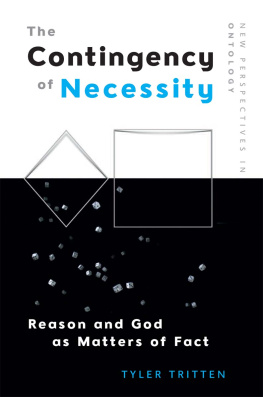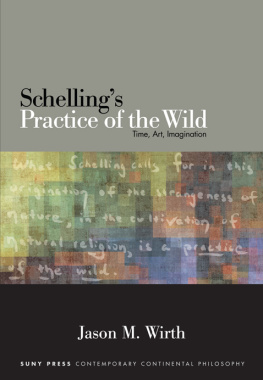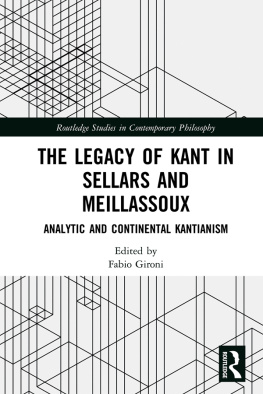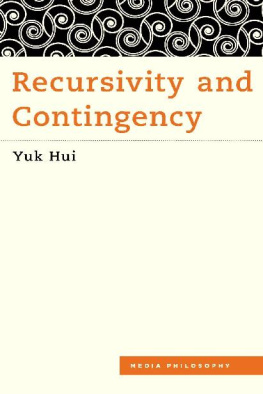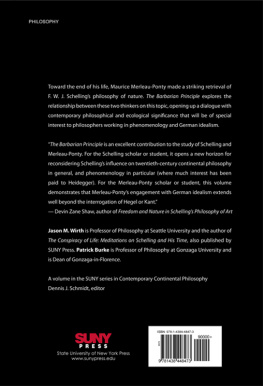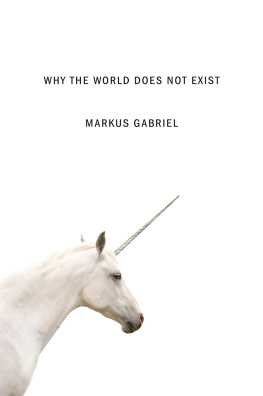The Contingency of Necessity
New Perspectives in Ontology
Series Editors: Peter Gratton and Sean J. McGrath, Memorial University of Newfoundland, Canada
Publishes the best new work on the nature of being
After the fundamental modesty of much post-Heideggerian Continental philosophy, the time is now for a renaissance in ontology after the rise of the new realisms and new materialisms. This new series aims to be an interdisciplinary forum for this work, challenging old divisions while borrowing from the ontological frameworks of post-humanism, ecological studies, critical animal studies, and other post-constructivist areas of endeavour. While often working within the Continental tradition, the books in this series will move beyond the stale hermeneutics and phenomenologies of the past, with authors boldly reopening the oldest questions of existence through a contemporary lens.
Editorial Advisory Board
Thomas J. J. Altizer, State University of New York at Stony Brook
Maurizio Farraris, University of Turin
Paul Franks, Yale University
Iain Hamilton Grant, University of the West of England
Garth Green, McGill University
Adrian Johnston, University of New Mexico
Catherine Malabou, Kingston University
Jeff Malpas, University of Tasmania
Marie-Eve Morin, University of Alberta
Jeffrey Reid, University of Ottawa
Susan Ruddick, University of Toronto
Michael Schulz, University of Bonn
Hasana Sharp, McGill University
Alison Stone, Lancaster University
Peter Trawny, University of Wuppertal
Uwe Voigt, University of Augsburg
Jason Wirth, Seattle University
Gnter Zller, University of Munich
Books available
The Political Theology of Schelling by Saitya Brata Das
Continental Realism and Its Discontents edited by Marie-Eve Morin
The Contingency of Necessity: Reason and God as Matters of Fact by Tyler Tritten
The Late Schelling and the End of Christianity by Sean J. McGrath
www.edinburghuniversitypress.com/series/epnpio
The Contingency of Necessity
Reason and God as Matters of Fact
TYLER TRITTEN

Edinburgh University Press is one of the leading university presses in the UK. We publish academic books and journals in our selected subject areas across the humanities and social sciences, combining cutting-edge scholarship with high editorial and production values to produce academic works of lasting importance. For more information visit our website: edinburghuniversitypress.com
Tyler Tritten, 2017
Edinburgh University Press Ltd
The Tun Holyrood Road
12(2f) Jacksons Entry
Edinburgh EH8 8PJ
A CIP record for this book is available from the British Library
ISBN 978 1 4744 2822 4
The right of Tyler Tritten to be identified as the author of this work has been asserted in accordance with the Copyright, Designs and Patents Act 1988, and the Copyright and Related Rights Regulations 2003 (SI No. 2498).
Contents
Acknowledgements
This book would not have come to fruition, at least not in this decade, without the generous financial support and flexibility of the Alexander von Humboldt Foundation. In this context, I wish to my express my sincere thanks to my hosts in the departments of philosophy and theology respectively at the Albert-Ludwigs-Universitt Freiburg, Lore Hhn and Andrzej Wiercinski. Without Andrzej, who first invited me to apply for the fellowship, I would scarcely be connected to the philosophical community. He is a great scholar, facilitator and friend. In my time at Freiburg, I also benefited from the companionship of Alexander Bilda and Philipp Schwab. Their knowledge of Schelling far surpasses my own.
I am extremely grateful that Edinburgh University Press has patiently stuck with me throughout the writing of this book. They are first-class publishers. Carol McDonald requires thanking in particular, whose expertise and advice I probably did not always follow as closely as I should have. The editors of the series in which this book appears, Sean McGrath and Peter Gratton, also merit special mention for their help throughout this process. Inevitable disagreements notwithstanding, I was enthused to learn that Sean and I may be philosophically kindred spirits.
All of my colleagues in the department of philosophy at Gonzaga University, who took a risk on me and my upside down metaphysics, have been steadfastly supportive. David Calhoun and Kirk Besmer in particular have endured philosophical discussions about many of the themes that appear in this book. I doubt I have yet convinced David of its basic theses but I would like to think I am close. Duane Armitage, a former colleague and present friend, has been there to educate me about all things Heidegger. Where my interpretation of Heidegger runs afoul, even if intentionally so, it cannot be said that he did not advise me of a more appropriate reading.
The editing and proofing of this book was greatly aided by Christopher Tof Chapin, Edward Butler, Daniel C. Barber, Vladimir Titkov and Annalee Ring. I thank them for their patience.
Finally, friends in philosophy without whom this text could not have come to be include Daniel Whistler, who carried me as we co-edited a special edition of Angelaki as I was completing the draft of this project; G. Anthony Bruno, who has provided stimulating exchanges on Meillassoux, Schelling and Heidegger; Jason M. Wirth, who has supported me personally and professionally throughout the years in more ways than I can name here; Marcela Garca, who is one of the friendliest and most approachable scholars I know; and Kyla Bruff, who, though at the beginning of her philosophical journey, undoubtedly has a great future ahead of her.
All acknowledgements, however, truly begin and end with my wife, Danielle A. Layne, who continued to thrive as a scholar and educator of ancient philosophy even as I made her into a single mother to complete this book, as I twice left her alone with our two sons for eleven months combined to work on this project in Freiburg, once as she was starting a new job. Not only did her academic career continue to thrive, but she remained a gracious wife and mother throughout. Her sacrifices have not gone unnoticed. In addition to all this, she has also served me in every professional function imaginable, from sounding board to dialogue partner to teacher to proofreader. Her philosophical genius shines brightly.
My eldest son, Simon, despite being the most precocious eleven-year-old I know, has not yet had the penchant to ask philosophical questions taught out of him. I hope this never changes. My youngest, Felix, always has the ability to retrieve me from my ivory tower (or maybe it is only a well) in order to pull me back into the real world of people and things. I love them both.
Finally, I cannot omit to mention the support offered by my parents, sister and grandparents. They have all made great sacrifices for me, even when they have not known or understood what I am doing. I wish I saw them more frequently.
If this book has a voice, it is a symphony of the voices just mentioned and of others that have remained unnamed. Nevertheless, I take responsibility for this symphony, particularly its faults, as its orchestrator. Perhaps one should no longer speak of the death, but rather of the inspiritus, of the author, in whose breath many voices are heard.
Introduction
An Attempt at a Speculative Ontology or an Alternative to Possible-God Theologies

